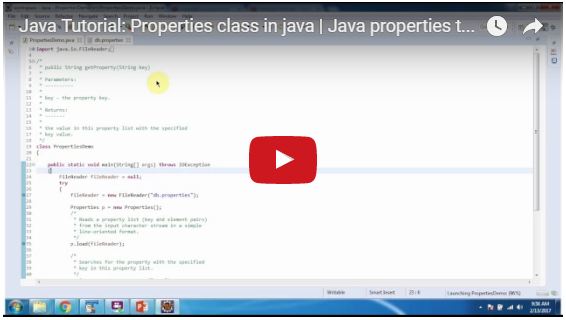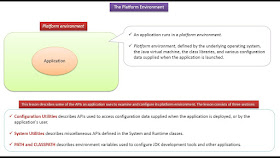import java.io.IOException;
import java.util.Iterator;
import java.util.Properties;
import java.util.Set;
class PropertiesDemo
{
public static void main(String[] args) throws IOException
{
/*
* Returns the system properties
*/
Properties p = System.getProperties();
/*
* Returns a set of keys in this property list where
* the key and its corresponding value are strings,
* including distinct keys in the default property
* list if a key of the same name has not already
* been found from the main properties list.
*/
Set<String> set = p.stringPropertyNames();
Iterator<String> itr = set.iterator();
while (itr.hasNext())
{
String key = (String) itr.next();
/*
* Gets the system property indicated by the
* specified key.
*/
String value = p.getProperty(key);
System.out.println(key + " = " + value);
}
}
}
Output
java.runtime.name = Java(TM) SE Runtime Environment
sun.boot.library.path = C:\Java\jre1.8.0_111\bin
java.vm.version = 25.111-b14
java.vm.vendor = Oracle Corporation
java.vendor.url = http://java.oracle.com/
path.separator = ;
java.vm.name = Java HotSpot(TM) 64-Bit Server VM
file.encoding.pkg = sun.io
user.script =
user.country = US
sun.java.launcher = SUN_STANDARD
sun.os.patch.level = Service Pack 1
java.vm.specification.name = Java Virtual Machine Specification
user.dir = D:\eclipse\workspace\PropertiesDemo
java.runtime.version = 1.8.0_111-b14
java.awt.graphicsenv = sun.awt.Win32GraphicsEnvironment
java.endorsed.dirs = C:\Java\jre1.8.0_111\lib\endorsed
os.arch = amd64
java.io.tmpdir = C:\Users\Ramesh\AppData\Local\Temp\
line.separator =
java.vm.specification.vendor = Oracle Corporation
user.variant =
os.name = Windows 7
sun.jnu.encoding = Cp1252
java.library.path = C:\Java\jre1.8.0_111\bin;C:\Windows\Sun\Java\bin;C:\Windows\system32;C:\Windows;C:/Java/jre1.8.0_111/bin/server;C:/Java/jre1.8.0_111/bin;C:/Java/jre1.8.0_111/lib/amd64;C:\ProgramData\Oracle\Java\javapath;C:\Program Files (x86)\AMD APP\bin\x86_64;C:\Program Files (x86)\AMD APP\bin\x86;C:\Windows\system32;C:\Windows;C:\Windows\System32\Wbem;C:\Windows\System32\WindowsPowerShell\v1.0\;C:\Program Files\Intel\WiFi\bin\;C:\Program Files\Common Files\Intel\WirelessCommon\;C:\Program Files\Lenovo\Bluetooth Software\;C:\Program Files\Lenovo\Bluetooth Software\syswow64;C:\Program Files\OpenVPN\bin;C:\Java\jdk1.8.0_111\bin;C:\Program Files\TortoiseGit\bin;C:\Program Files\Git\cmd;C:\Program Files\TortoiseHg\;C:\Program Files\Intel\WiFi\bin\;C:\Program Files\Common Files\Intel\WirelessCommon\;D:\eclipse;;.
java.specification.name = Java Platform API Specification
java.class.version = 52.0
sun.management.compiler = HotSpot 64-Bit Tiered Compilers
os.version = 6.1
user.home = C:\Users\Ramesh
user.timezone =
java.awt.printerjob = sun.awt.windows.WPrinterJob
file.encoding = Cp1252
java.specification.version = 1.8
user.name = Ramesh
java.class.path = D:\eclipse\workspace\PropertiesDemo\bin
java.vm.specification.version = 1.8
sun.arch.data.model = 64
java.home = C:\Java\jre1.8.0_111
sun.java.command = PropertiesDemo
java.specification.vendor = Oracle Corporation
user.language = en
awt.toolkit = sun.awt.windows.WToolkit
java.vm.info = mixed mode
java.version = 1.8.0_111
java.ext.dirs = C:\Java\jre1.8.0_111\lib\ext;C:\Windows\Sun\Java\lib\ext
sun.boot.class.path = C:\Java\jre1.8.0_111\lib\resources.jar;C:\Java\jre1.8.0_111\lib\rt.jar;C:\Java\jre1.8.0_111\lib\sunrsasign.jar;C:\Java\jre1.8.0_111\lib\jsse.jar;C:\Java\jre1.8.0_111\lib\jce.jar;C:\Java\jre1.8.0_111\lib\charsets.jar;C:\Java\jre1.8.0_111\lib\jfr.jar;C:\Java\jre1.8.0_111\classes
java.vendor = Oracle Corporation
file.separator = \
java.vendor.url.bug = http://bugreport.sun.com/bugreport/
sun.cpu.endian = little
sun.io.unicode.encoding = UnicodeLittle
sun.desktop = windows
sun.cpu.isalist = amd64
Click the below link to download the code:
https://sites.google.com/site/ramj2eev1/home/javabasics/PropertiesDemo_System_App.zip?attredirects=0&d=1
Github Link:
https://github.com/ramram43210/Java/tree/master/BasicJava/PropertiesDemo_System_App
Bitbucket Link:
https://bitbucket.org/ramram43210/java/src/fecc858ed896ce9bbf3cb92f5d438fc2de9eee22/BasicJava/PropertiesDemo_System_App/?at=master
See also:
All JavaEE Viedos Playlist
All JavaEE Viedos
All JAVA EE Links
Servlets Tutorial
All Design Patterns Links
JDBC Tutorial
Java Collection Framework Tutorial
JAVA Tutorial
Kids Tutorial
































